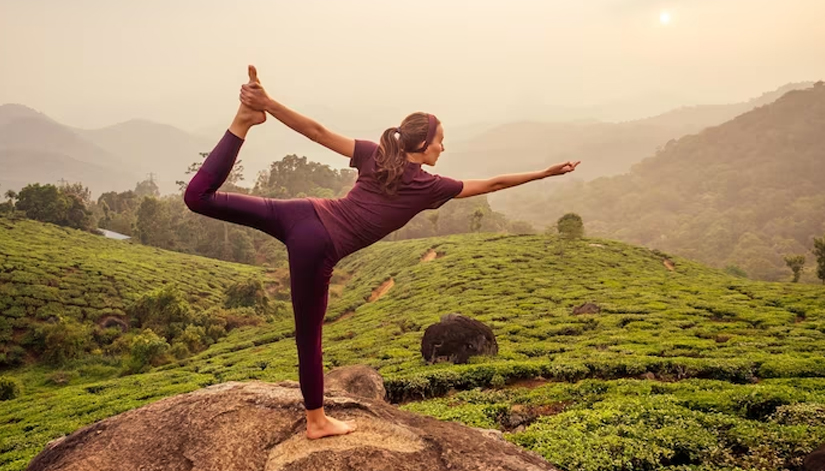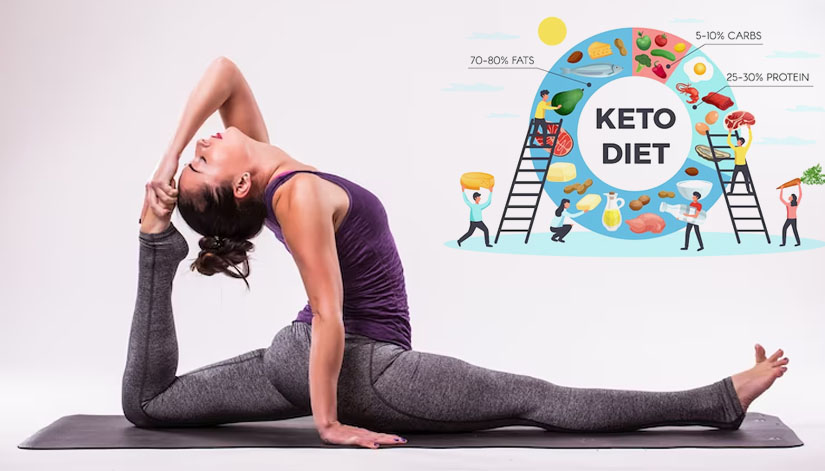A ketogenic diet is a strict weight loss programme on its own, but it becomes 10x more effective when combined with particular forms of physical activity, such as the mind-body practice of yoga. One Google search will show you a plethora of articles that claim keto and yoga are a wonderful match. It is the truth, and this article is also one of them. Both keto and yoga demand concentration and the same levels of dedication and produce the same result, in a complementary manner. Keto will benefit you in smoothening your body metabolism and yoga will only sharpen the weapon by toning your body and increasing spiritual and core strength.
When you do the keto diet, you substantially limit your carbohydrate intake while increasing your fat intake to 70-80% of your daily calorie requirement. This is when your body has to shift its primary energy source away from carbohydrates. As a result, it resorts to fat for energy. Slowly that leads to loss of body weight. Keto can be really effective for some people, but it is not the best way to eat for the entire population. Some people consume far too few calories overall as it is. People who fast regularly, their bodies are in severe need for nutrition. Some have conditions where their body is extremely sensitive to variations in energy input. For example, in some women, changing the macronutrients intake suddenly can lead to decreased thyroid function and potentially influence the regularity of their menstrual cycle. You may have higher cortisol levels, lower thyroid hormone levels, changed hunger and satiety hormones, and changes in estrogen and progesterone levels (which affect reproduction as well as electrolytes and hydration condition). So whenever you start a new diet, be it keto or any other low-carb options, give you body the time it needs to be accustomed to the new energy sources and then slowly start going to your workout sessions.
This is where a centuries old spiritual healing process like yoga comes in. Because yoga is all about mindfulness and being at one with the universe, it is suitable for everyone. Yoga seeks to harmonize the spiritual facets of the cosmic universe with our consciousness. It is recognized as the practice for spiritual awakening to help you let go of unfavorable or ego-centered ideas and behaviors. The regular practice of yoga enhances homeostasis in the body and the cosmos by integrating your emotions with your mental and physical well-being. There are more factors to consider when choosing a diet than just what foods you may or may not consume. Yoga lowers stress levels, calms the mind, and improves concentration. Stress alone causes blood sugar levels to rise, which might make it harder to stay in ketosis. The advantages are enormous, and it aids in keeping your body fit and well, including regulating the sugar levels in your blood.
At first, it may seem unusual to relate yoga, a thousand-year-old spiritual exercise, and the ketogenic diet, a postmodern diet notion. But there is adequate evidence to support why yoga and the ketogenic diet are a fantastic combination that work wonders for uniting the body and mind into harmony.
Despite your limits or medical history, there is always a type of yoga for you to practice, whether it’s restorative or more athletic kinds. Yoga varieties like pranayamas, asanas, and meditation merge in a smooth fusion when combined with the ketogenic diet. Yoga practitioners are more inclined to approach healthcare and wellness in its entirety, which encourages them to live by the maxim that “prevention is better than cure.” So, you can see that yoga asanas reap innumerable physical and mental health benefits. They last a lifetime if practiced regularly, whether you’re practicing in a hot yoga studio or atop a peaceful holy mountain.
Yoga improves physical flexibility, balance, and coordination, and combined with the keto diet, unlocks even greater benefits. The keto diet regulates blood sugar levels and the absence of glucose fosters a more stable mood for a greater amount of time. Practicing yoga as your primary form of exercise and relaxation during this time has been connected to increased levels of Zen and alleviate severe bouts of anxiety. So, you know what to do when you cannot afford therapy under these expensive medical environments. This has helped people deal with their PTSD symptoms greatly.
Finding a yoga style that works for your body and respects your health history is essential. If you’re chronically worried, anxious, or exhausted, don’t rule out softer styles of yoga in favor of power sessions. Remember to practice savasana and do not skip the first meditation because it will provide your body with what it lacks and needs. Just keep in mind if you’ve recently begun a new diet plan, avoid hot yoga and power courses because then your body will see this new change as stress, which will again, alter hormone levels.
Why Blend them Both?

Those who are new to keto and are participating in yoga, you might be more prone to a few mild afflictions. Fat as a form of energy helps you become leaner, stronger, and couple that with yoga, your body will only get more toned. For example, your energy will be abundant, and you’ll feel less tired with increased muscle tone and core strength. During the first few weeks of ketosis, you may notice a slight dizziness; your body is adapting to a new fuel source and gaining a greater ability to burn fat for fuel. As your body transitions from carbs to ketones for energy, you may experience what is known as the keto flu. This is where one tends to feel ill during the first two weeks, with dizziness, less stamina and even brain fog as the main symptoms. An excellent strategy to look out for yourself during this time is to drink a lot of water and electrolytes, and if you can, bone broth to increase your hydration and sodium levels. This adaptation will only reap benefits in the future as it will result in better endurance and faster recovery between exercises in the long run.
The Body benefits:

Using ketones allows the body to function better when you exercise without rapidly depleting our carbohydrate resources. This implies that you’ll have more energy at the end of your workout because your carb stores won’t be used that much. It enables slow and steady resistance training and other high-intensive workouts over time. Now if you’ve been on keto for a while and have not experienced the keto flu, but feel light-headed while doing yoga? You might consider taking a closer look at how you’re doing keto and what changes you can make to make it more suitable for your lifestyle. Many women have reported that they wound up reducing their calorie intake at the same time (500-700 cal) as they did keto, whether purposefully or unintentionally. Fat is satiating so this can increase your chances of feeling dizzy. Another reason you might feel unstable on keto is that your body is deficient in vitamins and minerals, or your blood sugar could also be low.
You have to master the art of listening to your body and understand its requirements. That way, you obtain all the nutrients your body needs to operate properly. Try not to focus on anything other than your body’s movement when doing a workout, especially when you are doing keto. It is a good way to keep your concentration in the present and not feel overwhelmed by distracting thoughts. Yoga, particularly slower variations like vinyasa, is generally acknowledged to ease tension and quiet and concentrate the mind. Stress is single-handedly responsible for raising blood sugar, making it more difficult to maintain the state of ketosis. Yoga and keto, combined helps maintain your stress levels along with your weight shredding objectives while also managing your stress and blood sugar levels. A keto diet balances the blood sugar and frequently improves mood. The duo also helps improve your sleep schedules, while keeping your depression and anxiety levels low.
While any diet can cause stress, in the beginning, a ketogenic diet significantly alters the structure of your metabolism and fuel sources. That is why some refer to keto as a lifestyle choice rather than a diet. The relaxed mindset that you achieve through yoga and meditation induces a calmer mindset and stress gets significantly lowered, and that way, you don’t feel as hungry anymore. It is truly a chain reaction, you can say.

